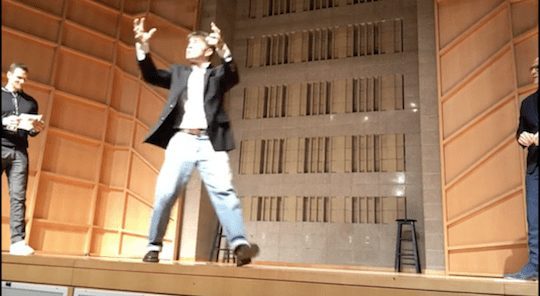
I was running around the stage spouting gibberish while another student translated what I said into normal English.
I am sure I looked and sounded like a compete idiot, no two ways about it.
Somewhere in the back of my mind was the uncomfortable realization that anyone in the audience could film this and post it to Facebook if they chose to.
It was, in short, one of the most valuable and impactful learning experiences I have had in at least a decade.
Why? Well, read on – I guarantee it is worth the few minutes of time is will take.
The scene above occurred in a public speaking masterclass I participated in with Michael Port, a teacher I highly recommend if you want to up your speaking game dramatically.
The masterclass took place in New York, and I ponied up some significant cash to get an hour of on-stage coaching with Michael while others had the opportunity to watch, provide questions and comments, and learn from my experience.
It was, to be honest, nerve-racking, scary, and … well … risky.
And that was a large part of why it was so effective.
Yes, Michael knows his stuff. He has the expertise to provide the needed guidance. In short, he has mastered his content.
But Michael has also mastered context.
He knows that pushing student outside of their comfort zone, pushing them to take some risks, is a key way to ensure that learning happens. Risk helps to make the experience memorable, it stretches us in a way that is essential to effective practice. It sparks transformation.
Of course, you can’t just throw people into a risky situation and expect positive outcomes. And Michael clearly understood this. He set clear ground rules with everyone involved, he built rapport. He already had a relationship with many people in the room, and he rapidly laid the foundation for a relationship with the newcomers.
In short, he literally “set the stage.” He orchestrated the context in which risk would be acceptable.
A key problem with most online courses is that nothing like this happens.
There is no risk. No pushing people out of their comfort zones. And probably worse, in most cases the course developer has not built enough of a relationship with learners to make risk acceptable.
Now, you may be thinking that online courses simply can’t provide much chance for risk, but I bet you can think of many ways to orchestrate risk if you just put a little time into it.
You can, for example, require students to submit work – videos, writing samples, etc. – for review by other students.
You can use Zoom or a similar tool to hold live “hot seat” sessions in which students have to present, debate, practice – whatever makes sense.
You can challenge students to post some form of “minimum viable product” out on social media.
You get the picture.
There are plenty of ways to create risk, and most courses would benefit from making use of some of them.
Of course, as I have already noted, you can’t just introduce risk and expect it to be beneficial if you have not developed a relationship with your learners. This is another reason why developing your audience – and continually deepening your relationships within it – is at least as important as developing your course.
Ultimately, the relationship you develop with your audience is a key factor – arguably, the key factor – in whether your course will be impactful.
It will enable you to be more exclusive and attract learners who truly care about what you have to offer.
It enables you to add the element of risk – in a productive way.
I’d argue that, ultimately, it is one of the most powerful determinants of whether your learners finish your course, actually apply your teaching, and come back for more.
As far as coming back for more goes – the masterclass experience motivated me to sign up for Heroic Public Speaking Graduate School, an exclusive offering that costs many multiples of what I paid for the masterclass. I used it as a springboard for taking my keynote speaking on lifelong learning to new levels. Given the amount of money involved, it felt like a big risk, but my experience gave me the confidence it would pay off. (And, yes, it has!)
So, how will you introduce a little more risk into the learning experiences you offer?
Jeff